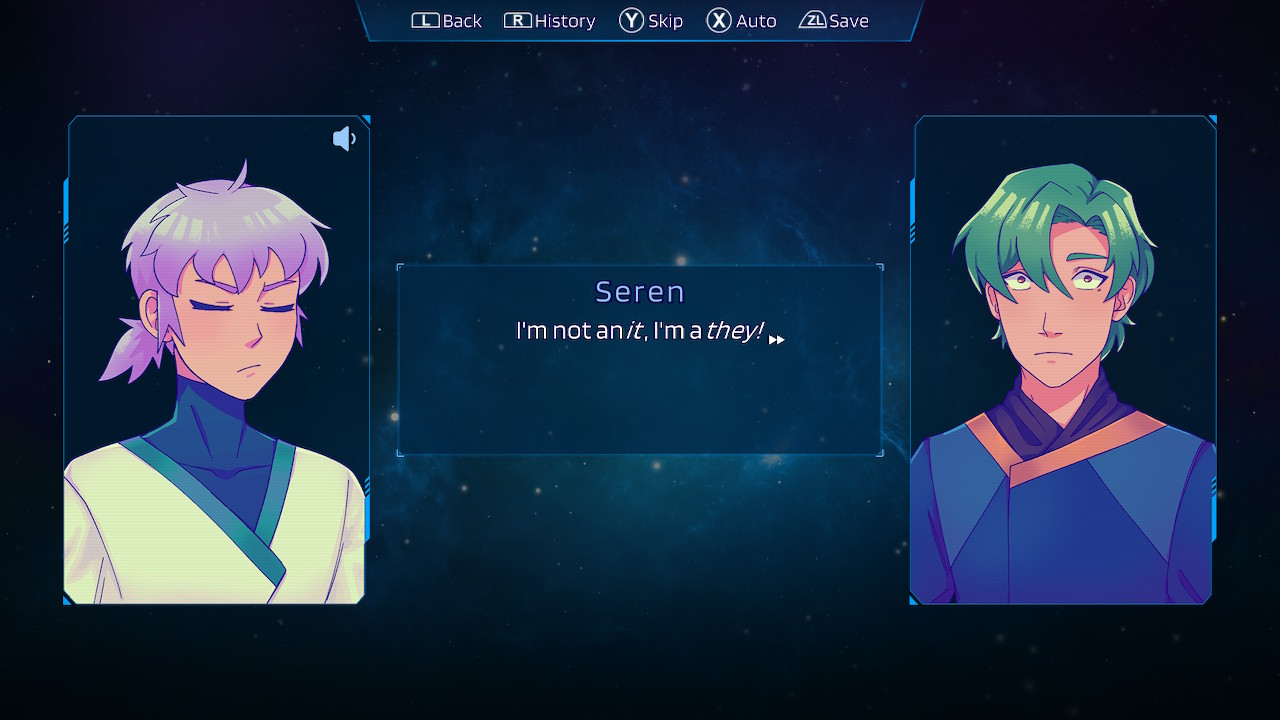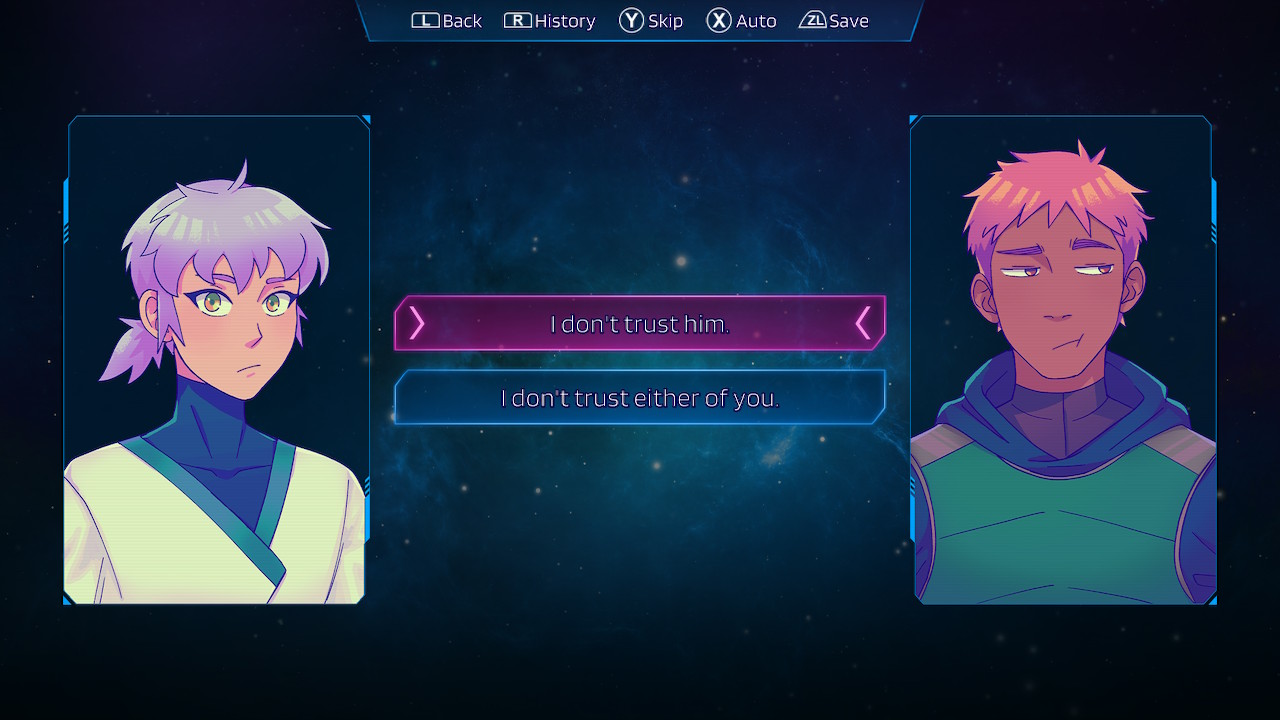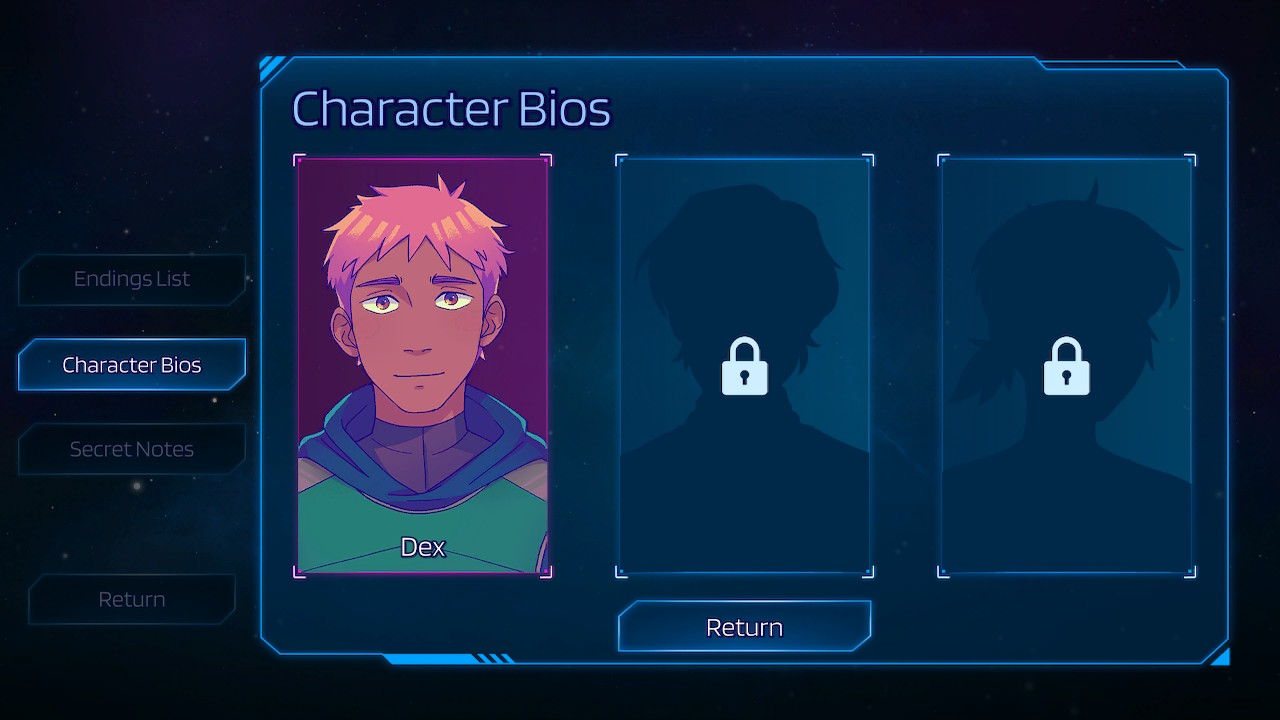What is it that ultimately makes one human? What makes one sentient? Is it through creation, or what we end up choosing to do instead? Do the bonds we forge for ourselves impact our identities? Developer Hollowmend and publisher Viridian Software’s Pirated Code: Admin Edition seeks to answer those questions in a colorful sci-fi visual novel about friendship and love seen through the eyes of one AI on a quest for self-discovery.
Initially a visual novel project conceived for the NaNoRenO 2021 event, this version of Pirated Code is revamped with added content for its release on Steam and Nintendo Switch, with upcoming Xbox and PS4/PS5 ports. The Admin Edition features new narrative content and story unlockables to entice a return trip or a first-time voyage. I have yet to play the original version, but I find the added content seamlessly interwoven into the game. One can only tell the difference if trying to use a guide, like the developer-provided Endings Guide from the original version of Pirated Code, to see all the story routes the VN provides. There are a plethora of new choices and added scenes based on what I’m seeing was initially there. Admittedly, that also makes the guide harder to utilize for the Admin Edition, but it still points you in the general right direction if you’re looking to see all the routes. It takes around three hours to see everything the game has to offer, but I’m impressed by just how much overall content there is to find in Pirated Code: Admin Edition, even with a relatively short playtime.

Seren is a sentient artificial intelligence program who could have had a better start to their day at the beginning of Pirated Code. Seren gets uploaded onto a courier ship called Patsy by a relatively unimpressive pilot named Dex. As it turns out, Dex might be a space pirate who has stolen Seren and illegally downloaded them, so their partnership doesn’t exactly get off to a great start. On top of that, Seren’s code became corrupted in the upload process, and they no longer have access to their memories. A temporary truce is created between Seren and Dex as they both need each other’s help to get out of their current predicaments. They even begin developing a rapport over time as Seren realizes Dex isn’t quite as nefarious a pirate as they initially believed based on first impressions. Of course, as is expected, Seren’s mysterious past is darker and more looming than either of them realizes.
Probably due to its shorter playtime, the cast of characters in the main story, in particular, is limited. The three main characters are Seren, Dex, and Dex’s operator, aptly called Operator. They’re all unique and have rather fleshed-out personalities. I found Operator’s “say it plainly” quirk highly amusing, and Dex’s generally positive outlook on everything is infectious. Seren is a standout lead, too: I love their reactions to things and the development they gain if you uncover the good endings and subsequent epilogue. Other characters, such as the formidable Captain and the mysterious stranger who contacts Seren, are also quite interesting. Whether or not you choose to have the relationship that develops between Seren and Dex be romantic or platonic, the ending scenes between them are sweet and touching. I also have to give Pirated Code credit for being rather inclusive, too, as it is still too rare to have a non-binary main character in video games (and Seren is an excellent protagonist at that!). There are implications if you pursue a romance route between them and Dex that Dex is somewhere on the asexual spectrum, which we’re slowly starting to see more representation of in video games.

Pirated Code is a traditional VN with some relationship and status-building elements. Players take on the role of Seren, wading through text and dialogue onscreen until reaching a decision point. Then, based on your response choice, the story shifts in a new direction. At the same time, you’re also developing a relationship with Dex, and specific responses to particular scenarios build up a trust stat with him. Towards the end of either “good” ending route, you can decide if Seren and Dex’s rapport has evolved on a romantic or platonic level, depending on your preference. There is also a corruption resistance status to track, as specific actions will sometimes increase or decrease this stat. If Seren’s corruption resistance falls too low, it has a later impact on how you’ll get to view decision points in specific routes. Given that the game is relatively short, it provides a surprisingly large amount of content. The two statuses are interesting enough, and the number of decisions you have to make is relatively high and helps keep the game from getting too stagnant.
Pirated Code: Admin Edition features a help menu that provides a controller layout, some language options, message speed preferences, and both music and volume control. An Extras section in the game’s main menu offers an endings checklist to help you keep track of what you’ve uncovered, as well as character bios and secret notes you unlock based on decisions made throughout the game and what story scenes you’ve seen. Pirated Code is easy enough to pick up if you’ve ever played a visual novel. A helpful but not obligatory history log can be accessed at any time while playing, and you have auto-speed and skip-text options for script lines you’ve already read. Pirated Code is an excellent VN experience with often even more choice implementation than I sometimes expect from the genre.

Graphically, Pirated Code: Admin Edition has a crisp UI cleverly disguised as Patsy’s comm-link, so the head portraits only for characters make a lot of sense visually. The character designs are lovely, with colorful art and expressive faces. I love how the text boxes even indicate if someone is talking farther away from the comm-link or whispering by using a smaller font for their dialogue! There are even little manga-style emojis for exasperated or frustrated moments to further showcase a character’s feelings. Since there is no spoken dialogue, the UI provides helpful indicators of who is talking at any given time thanks to the mouths on the character portraits moving and an audio symbol showing up in the corner of their picture. The script is error free, and the dialogue flows believably between characters and scenes. The music is somewhat limited, given how short the game is, but Cyberleaf Studio did a great job capturing a bouncy, sci-fi aesthetic. If you’re curious, you can hear a sampling of the music in the game’s trailer.
Narrowing down weaknesses in Pirated Code: Admin Edition is notably tricky as there is quite a bit of enjoyable content uncovered throughout its shorter play length. It only has some of the bells and whistles of a higher-budget VN, relying solely on its UI and expressive character portraits to convey its tale instead of having, for example, unlockable CG illustrations. Still, the story you uncover more than makes up for that because of how engaging it is. The character bios and secret files you unlock as incentives for playing through certain branches of the game help to offer even more substantial lore and backstory to the title, which I find pretty neat myself, even if there aren’t flashy CG screens. The overall gameplay experience is quite polished!
Pirated Code: Admin Edition is yet another solid title in both the Switch’s and Steam’s impressive visual novel lineups, and I’m glad that it’ll be coming to Xbox and PlayStation platforms, too, so that more people hopefully get the chance to try it out. It is a charming, touching sci-fi story with surprising depth and unlockable content, even with its shorter length. You might end up playing it in its entirety in a single day, but it will be an enjoyable day if the story resonates with you!


